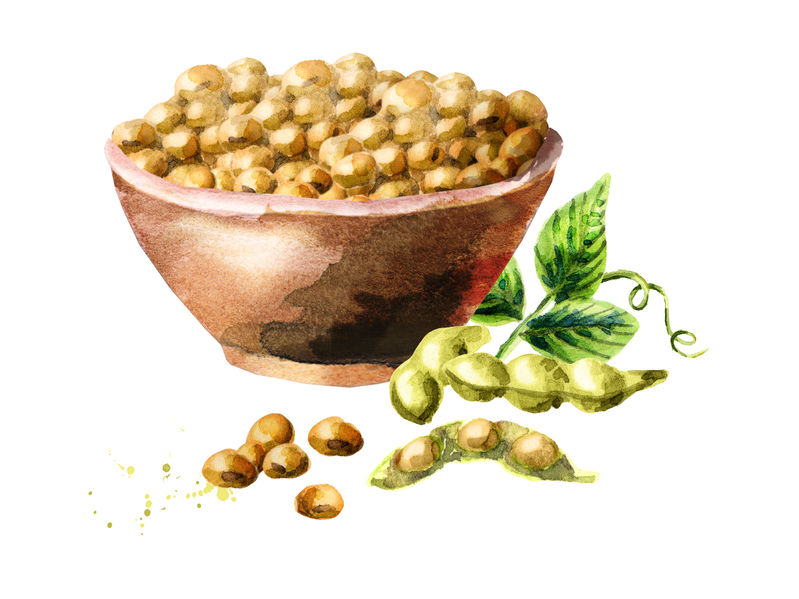Soya beans have a very adaptable texture so are used in a range of foods such as soya milk and tofu. Should you be consuming these products as part of a healthy balanced diet? What are the health benefits of consuming soya beans?
What are soya beans?
Soya beans are also known as soybeans, soy and edamame (young soybeans). Soy is produced in both temperate and tropical regions. According to the world wildlife fund since the 1950s, global soybean production has increased 15 times over. The United States, Brazil, and Argentina together produce about 80% of the world’s soy. Soybeans are edible seeds grown in a pod, they can be green, yellow or black. But what are the health benefits of consuming soya beans and are they good for the environment?

What kind of products are made from soya beans?
- Soya milk, yoghurts and cheese
- Tofu
- Soy sauce
- Fermented bean paste
- Natto
- Tempeh
- Soybean meal
- Textured vegetable protein
- Soybean oil
Look in our recipe section to find recipes using soya beans.
Are soyabeans sustainable
Behind beef, soy is the second largest agricultural driver of deforestation worldwide. At the moment the soybean industry is causing widespread deforestation.
Deforestation leads to
- Displacement of small farmers and indigenous peoples around the globe.
- Destruction of forests, grasslands, and wetlands
- Native habitats are lost
- Accelerates climate change
- Water pollution
- Disrupts rain and prolongs drought
How to improve sustainability
- WWF is encouraging the development of better farming practices, by calling for transparent land-use planning processes and promoting responsible purchasing and investment policies.
- Try and use responsibly sourced soya products
- Around 75% of soy worldwide is used for livestock feed. If we cut down on meat consumption it would help reduce the pressure on natural ecosystems.
What are the health benefits of consuming soya beans?
Health benefits of consuming soya beans
Soy is high in
- Polyunsaturated fats (and low in saturated fat)
- Fibre
- Vitamins
- Minerals
- Polyphenols (a type of antioxidant)
- Amino acids (soy is a complete protein)
Soy has been shown in some research to
- Improve heart health – soflavones have been shown to reduce inflammation and improve elasticity of blood vessels. They are also legumes and diets rich in legumes have a strong link to a lower risk of heart disease.
- Lower cholesterol levels – this may be due to the decreased consumption of red meat. This cholesterol lowering effect is found more with the least processed soybean products.
- Lower blood pressure – due to its high levels of arginine, an amino acid and isoflavones
- Help control blood sugar levels – isoflavones may be the cause of this slight improvement in blood sugar levels,
- Reduce the effects of menopause – isoflavones mimic oestrogen and bind to oestrogen receptors in the body. The symptoms of menopause may be caused by a lower level of oestrogen production, so the consumption of soy production may help.
- Improved bone health – as mentioned in the previous point isoflavones can mimic oestrogen. Low oestrogen levels cause calcium to leach from bones. However more research is needed in this area.
- Decrease risk of certain diseases such as cancer – the most research has been done on breast cancer and the positive effect has mainly been observed in Asian women. Other cancers where the consumption of soy may reduce the risks are endometrial cancer, digestive tract cancers and prostate cancer.
Potential adverse health effects of consuming soya beans
- Some antinutrient effect, where the body is unable to absorb the vitamins and minerals contained in soy. However, cooking, soaking and also fermenting can reduce these negative effects.
- Soybeans are frequently genetically modified which can lead to a lower nutrient density and increased herbicide use. This lower nutrient density also applies to more processed soy products
Other common concerns around consuming too many soy products and oestrogen mimicking effects, are cancer risk, thyroid function, feminizing effects in men and digestive issues. None of these effects are backed by enough science to comment as to the truth in them. However, the majority of studies in this area disprove the links between consuming too much soy and these negative health effects.
Conclusion
Although there are some negatives to consuming soyabeans. In general, the positives outweigh them. The high protein content and low saturated fat content make them a suitable choice to replace red meat. The high fibre, vitamin and mineral content makes it a nutritionally dense food. However, it is important to consume it in moderation as part of a healthy balanced diet. It is also important to choose the correct soy products, for example the less processed they are the better the health benefits.


